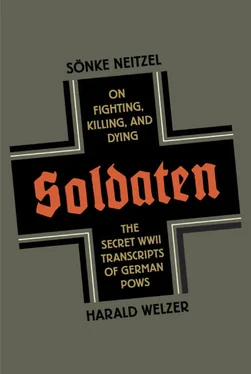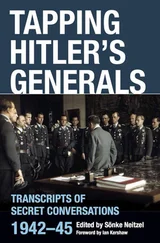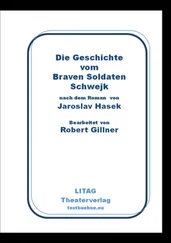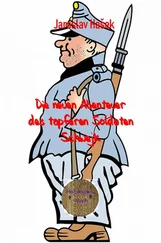The German army, then still known as the Reichswehr, profited from this trend, and their demands could count on a broad echo in society as a whole. By 1933, the groundwork had already been laid for German society to be completely penetrated by the idea of Germany’s acute need to defend itself. On May 25, 1934, the president of the German Reich, Paul von Hindenburg, and his war minister, Werner von Blomberg, drew up a list of duties for German soldiers. This document located the roots of the Wehrmacht in a glorious past and defined military honor as an unconditional willingness on the part of soldiers to make sacrifices, including their own lives, for their people and homeland. Fighting courage was identified as the greatest virtue a soldier could possess. The list demanded steely determination, decisiveness, and vigor, while cowardice was dismissed as contemptible, and hesitation unworthy of a soldier. Military leadership entailed an eagerness to make decisions, measured ability, and tireless care for one’s charges. Military leaders and troops, the document asserted, had to become an unshakable fighting community of comrades, and in his willingness to carry out his duties the soldier was to serve as a role model of masculine strength for the German people. {55} 55 Karl Demeter, Das Deutsche Offizierskorps, 1650–1945 (Frankfurt/Main: Bernard & Graefe, 1965), p. 328.
This catalogue of duties showed that, while the Wehrmacht of the early 1930s positioned itself as a part of German military tradition, it was adopting new accents. The emphasis on “unconditional willingness to sacrifice” and “steely determination” shows how battle was defined as the central element of soldiers’ existence. In keeping with the myths of incredible German courage on the front lines during World War I, living up to the demands of battle was the ultimate litmus test of a soldier’s worth, to which all other considerations were subordinate. {56} 56 See also Christian Kehrt, Moderne Kriege: Die Technikerfahrungen deutscher Militärpiloten, 1910–1945 (Paderborn: Schoeningh Verlag, 2010), p. 228.
This catalogue of military virtues did not change substantially during World War II.
Admittedly, a paper published by the highest echelons of the military leadership is not necessarily proof that soldiers adopted a specific military value system into their frame of reference, but personnel files often suggest that was indeed the case. Superiors regularly evaluated every German officer, and the categories the evaluations contained included personality, strength in the face of the enemy, achievements while carrying out duties, and mental and physical abilities. A glance at this nearly endless and often ignored source reveals that the training desired by Germany’s military leadership had taken root at least in the reference frame of the corps of officers. In the files, a personality of “high military quality” was defined as being energetic and “strong-willed,” “brave and demanding of itself,” “physically adroit, tough and with great endurance.” Courage, energy, toughness, willingness to act, and decisiveness were needed, if the officers wanted to receive a positive evaluation and position themselves for promotion. It was also important for officers to show that they were “crisis-proof.” For instance, a superior wrote of the future lieutenant general Erwin Menny: “He knows no difficulties.” Likewise General Heinrich Eberbach was repeatedly praised in the course of his career as a “brisk and prudential tank commander equal to the most difficult situations…. He’s one of our best.” Enumerating his particularly positive traits, a superior characterized Eberbach as “brave, loyal, steadfast.” {57} 57 Sönke Neitzel, Abgehört: Deutsche Generäle in britischer Kriegsgefangenschaft, 1942–1945, 4th edition (Berlin: List Taschenbuch, 2009), pp. 452, 456, 435, 449, 440.
Negative attributes for soldiers were softness, “lack of energy,” {58} 58 BA/MA, Pers 6/6670.
lack of “resilience,” {59} 59 BA/MA, Pers 6/9017.
and insufficient “hardness of will and ability to withstand crises.” {60} 60 Neitzel, Abgehört, p. 457.
For instance, in 1944 a superior wrote of Major General Albin Nake, the commander of the 158th Reserve Division: “A typically East Prussian commander, who does not possess the severity and decisiveness to lead a division in the most difficult situations.” {61} 61 BA/MA, Pers 6/770. Freiherr von Adrian-Werburg received a similar evaluation; see 2 September 1943, BA/MA, Pers 6/10239.
General Otto Elfeldt was criticized for allowing “his sub-commanders too much independence of opinion.” {62} 62 Neitzel, Abgehört, p. 442.
A superior wrote of Major General Alexander von Pfuhlstein: “Pfuhlstein is a pessimist. Probably a congenital one. He lacks the conviction of belief in the National Socialist idea. For this reason, he tends to forgive obvious failure in his troops.” {63} 63 Ibid., p. 468.
After this damning report, Pfuhlstein was relieved of his division command. Colonel Walther Korfes, the commander of Grenadier Regiment 726, even became the subject of an investigation as to whether he had been honorably captured or not by British forces. Previously, he had been classified as a “fundamental skeptic and critic.” {64} 64 BA/MA, Pers 6/6410.
The evaluations contained within the personnel files of Wehrmacht officers also suggest that the ideological changes brought by National Socialism to the military value system were limited. Significantly the words “sacrifice” and “fanaticism” do not occur in army files. (The ones from the navy were largely destroyed.) Only SS files contain this sort of vocabulary. For instance, an evaluation of SS Lieutenant Colonel Kurt Mayer of April 29, 1943, reports that his “massive success… is the result solely of his fanatical willingness to do battle and his circumspect leadership.” {65} 65 Neitzel, Abgehört, p. 462.
Willingness to sacrifice and fanaticism were two unquestionable indications of an increasingly ideological system of values. The ideal of the “political soldier,” ceaselessly promoted by Nazi propaganda, was not only a courageous but a fanatic fighter, willing to sacrifice himself. These terms repeatedly crop up in conjunction with soldiers who were committed National Socialists. One of the most prominent was Admiral Karl Dönitz. When he assumed command of the German navy on January 30, 1943, he declared that he planned to lead with “ruthless decisiveness, fanatic commitment and the most iron will to victory.” {66} 66 Cited in Förster, “Geistige Kriegführung im Deutschland 1919 bis 1945,” in Das Deutsche Reich, Vol. 9/1, p. 554. On Dönitz, see Dieter Hartwig, Großadmiral Karl Dönitz: Legende und Wirklichkeit (Paderborn: Schoeningh, 2010).
In countless commands, he demanded the same commitment from his troops. And Dönitz was hardly alone. Fanaticism became an omnipresent category in the official correspondence of the military leadership in the second half of World War II.
Nonetheless, it is surprising that “National Socialist attitudes,” which were introduced as an official category in the fall of 1942, did not play a particularly important role in the evaluation of officers. In much of the army, common sense seems to have dictated that this political category should not be a decisive criterion. The formulae “National Socialist” and “firmly grounded in National Socialism” were used in inflationary fashion. In June 1943 director of military personnel Lieutenant General Rudolf Schmundt even complained that the terms were thrown about so cavalierly that “they can hardly yield any sort of evaluation.” {67} 67 Report of Activity, Schmundt, 24–25 June 1943, p. 75.
A glance at the files confirms that firm National Socialist beliefs were attributed even to officers with demonstrable skepticism toward the Nazi system. More reliable conclusions about political attitudes could only be made when the evaluations used stronger language, for example, “a solidly rooted National Socialist who orients his duties as a soldier accordingly” (evaluation of Colonel Ludwig Heilmann). {68} 68 See also the evaluations of Generals Friedrich von Broich and Walter Bruns in Neitzel, Abgehört, pp. 432, 434.
Читать дальше












